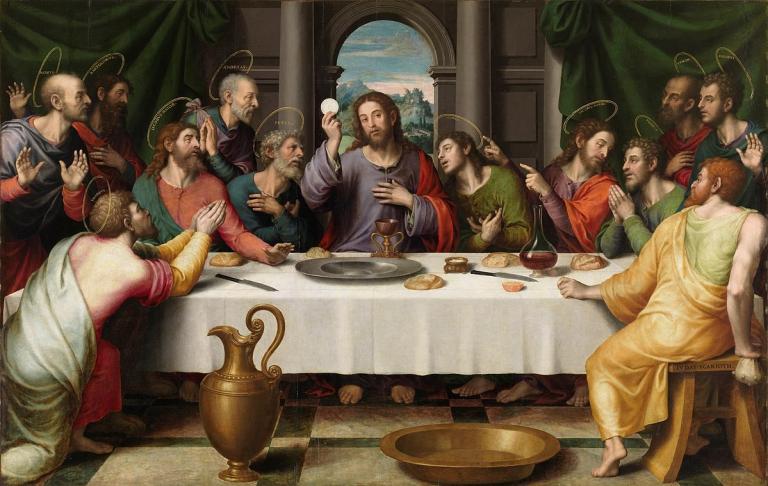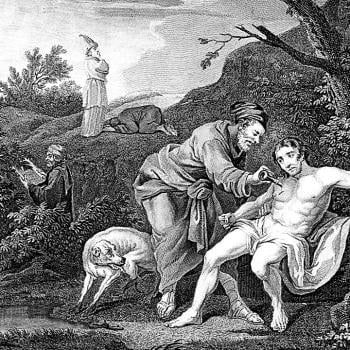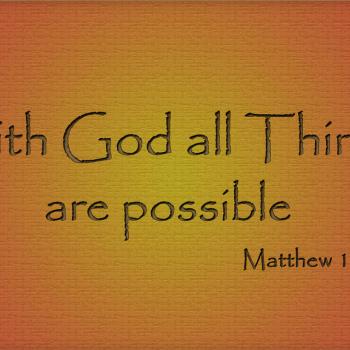When I was a kid, I remember asking my mother once at Mass right before communion:
“Does the priest ever run out of hosts?”
She gave me a quick and hushed response, “No, he never does.”
My mind registered her answer with utter amazement. The priest never runs out of hosts! God must miraculously keep putting hosts in there! In my little mind, I imagined angels dropping hosts into the ciborium to make sure there were plenty of them.
Though this would be an amazing thing, and technically nothing could keep God from multiplying hosts if He so desired, even more amazing, is what ordinarily happens every time the Mass is celebrated.
It is more amazing than Elisha feeding one hundred hungry men as he did in the first reading, and more amazing than Jesus feeding five thousand men plus women and children, as we heard in the Gospel passage.
The same God who has created everything that exists out of nothing, transforms ordinary bread and wine before our eyes, into the Body and Blood of Jesus his Son, and offers it to us as food for the journey.
Some years ago I had the opportunity to visit the Church of Saint Dominic in Orvieto, Italy. This church contains a few “must see” items for the nerdy fans of Saint Thomas Aquinas, so in I went. Saint Thomas lived and taught in Orvieto for about one year in the 13th century and at this church.
I saw the chair from which Saint Thomas taught university students, and I saw his breviary, the prayer book every priest has. Unfortunately, I was unable to see the most prized item: the crucifix he used during prayer time. It is said that while he prayed before this crucifix he heard Christ say, “you have written well of me, Thomas.”
I could not see this crucifix because the chapel was being renovated, and there was a huge white sheet covering everything. I did pull and tug on the sheet to at least get a glimpse of the crucifix hanging on the wall. So defeated and frustrated, I sat on a pew and stared at the white sheet. I tried to pray, but I was so upset I could not focus, until the words of the Liturgy of Saint James came to mind, words beautifully paraphrased in the popular hymn, Let All Mortal Flesh Keep Silence:
Lord of Lords in human vesture, in the body and the blood.
He will give to all the faithful His own self for heavenly food.
Just as Jesus vests himself in humanity for us to come to know God the Father, just as Jesus vests himself in white bread to enter into our souls, the famous crucifix vested itself in a white sheet in front of me. The crucifix was there, but veiled in white, just as Jesus is truly present in the Eucharist, but veiled in white. I could not see the crucifix, but it was there; likewise, in the Eucharist I cannot see Jesus, but he is there, veiled. Veiled in human vesture and given to us for heavenly food.
We are truly blessed because we have been called to share in the supper of the lamb. The Lamb of God, Jesus Christ, who takes away the sins of the world comes into our bodies to transform us.
Saint Athanasius, great saint of the early church, wrote, “God became man so that man could become God.” At this banquet we become what we eat. God comes to us so to lift us up to Him, and we share in His divinity as He has shared in our humanity in Christ.
How is it that our lives are different because we receive Jesus Christ in the Blessed Sacrament? Week after week, for some, day after day. If we did not have this great gift, would we feel something lacking? The Eucharist matters, so our lives should be different because we receive the Body and Blood of Our Lord. Our lives are different because God raises us up to Himself.
Our lives are different because the Eucharist allows us to embrace the unconditional love that Christ has shown us. A sacrificial love that gives it all. The Eucharist allows husbands to love their wives more, and vice versa; parents to love their children more, and vice versa. It allows us to love coworkers, acquaintances, friends and strangers. It allows us to love those who annoy us, those who hurt us or frighten us. Those most unlike us, and those we disagree with. It allows us to see each person as God sees them.
I remember walking with my mother towards the priest and watching in awe at her receiving something I could not yet receive. I stood beside her, admiring this mysterious food. Pray that we may never lose the wonder and awe that the Eucharist instills in us. God comes to be among us! And to lift us up to Himself.
Picture from the public domain. Credit here.














